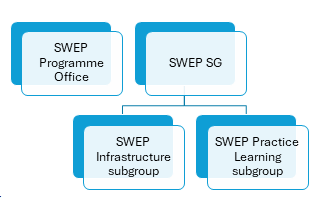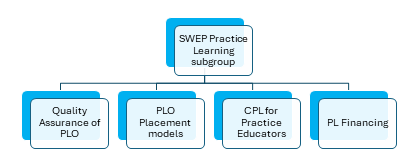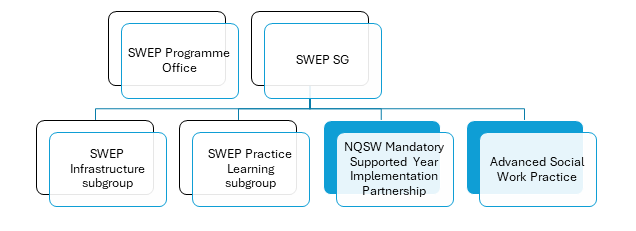Historically, formal and informal educational arrangements vary hugely across Scotland and remain shaped by previous agreements and relationships formed by the geographic learning networks. The organisations and sectors worked to agree on and jointly resource the local workforce priorities. These partnership networks were operated over the following local authority areas: North; Shetland, Orkney, Western Isles, Highland, Moray, Aberdeenshire, Aberdeen City, Tayforth; Angus, Dundee, Perth & Kinross, Clackmannan, Stirling, Falkirk, Fife, South-East; Borders, East Lothian, Midlothian, Edinburgh, West Lothian, West; Dumfries & Galloway, South, East and North Ayrshire, Renfrewshire, Inverclyde, East Renfrewshire, West and East Dunbartonshire, North and South Lanarkshire, Argyll and Bute, Glasgow.
The workforce development functions of the networks were transferred to the Scottish Social Services Council (SSSC). While the North network ceased, Tayforth delivered joint Practice Learning courses until 2021, and West evolved into Learning Network West and continued to operate until 2025.
The SSSC outlined a commitment to developing a new approach to professional learning in Scotland through a learning strategy that addresses qualifying and post-qualifying learning for the social service workforce.
The Scottish Government published ‘Social Services in Scotland: A Shared Vision and Strategy 2015 – 2020’ guided by the Social Work Services Strategic Forum (Scottish Government/Social Work Services Strategic Forum, 2015). The strategy includes an action to support implementing any recommendations agreed upon following the SSSC’s Review of Social Work Education.
The Review of Social Work Education (SSSC, 2016) concluded that social work education in Scotland is ‘fit for purpose’; however, it is facing significant challenges similar to those facing the profession as a whole. This underlined a continued commitment to a generic social work degree, with undergraduate and postgraduate routes, albeit with clear areas for enhancement. The Review recommended developing a national infrastructure for social work education, as the existing partnerships “rest largely on goodwill, have no regulatory reach to employer partners and lack the infrastructure and professional leadership to consistently realise required outcomes”. It also highlighted the need to improve the consistent availability of high-quality practice learning opportunities across Scotland, particularly in the statutory sector.
The Social Work Education Partnership (SWEP) was established by the Office of the Chief Social Work Adviser (OCSWA) in response to the Review recommendations, including the creation of the SWEP Programme Office hosted by Social Work Scotland (SWS)with the following initial focus:
- Development of a regional infrastructure to support engagement by HEI providers of social work qualifying programmes and providers of practice learning opportunities. That lead to establishing the SWEP Regional Infrastructure Subgroup (subsequently named the SWEP Infrastructure Subgroup).
- Development, agreement and implementation of national and/or regional approaches to ensuring the consistent delivery of sufficient high quality practice learning opportunities for all social work students, leading to the development of the SWEP Practice Learning Sub-Group.

The SWEP Practice Learning subgroup undertook work to analyse the quantity and quality of placements. The subgroup created four short life groups focused on themes central to practice learning, assessing options, actions needed, external resources, and decisions required to support improvements.

It is important to note that, in 2020, due to COVID-19, the priorities of the SWEP groups were altered by the need for emergency responses, which underlined the longstanding challenges. You can read the Evaluation of a pilot of 120-day practice learning contingency measure in Scotland during the COVID-19 pandemic.
The Practice Learning subgroup became central to working around resumptions of placements,
- Coordinating national safety plans,
- Supporting staggered placement starts across universities,
- Designing and reviewing alternative PLOs used during the Covid-19 pandemic (i.e. Advanced Skills Module 21/22 and 22/23).
- Advising, assessing and reviewing steps towards recovery, such as National Link Working training and Practice Learning Qualifications.
A short life working group considered the background information on previous and existing regional arrangements and completed a SWOT analysis. The group concluded: “Our review of models of practice learning in social work and related professions makes clear that the most effective regional partnership models are those which are supported by a coordinated national approach to practice learning provision”, recommending social work education learns from other professions and nations and seeks to formalise partnership structures to underpin social work education.
To achieve this, the SWEP Regional Infrastructure subgroup was renamed the ‘SWEP Infrastructure subgroup’ to acknowledge the need for both regional and national infrastructure. The subgroup had representation from CSWOs and HEIs from the three regional areas (North, East, West), SSSC, and SWEP.
The Quality Assurance group focused on improving placement quality through consistent documentation, modifying the BASW quality assurance tool for Scotland, and recommending a review of tools like QAPL using an incremental model of change.
The Placement Models group highlighted that the one-to-one placement model was insufficient due to the placement shortage, worsened by COVID-19. The group recommended a flexible, overarching model that accommodates regional and organisational differences while utilising the contributions of the third sector to enhance practice learning.
The Continuous Professional Learning (CPL) group assessed the CPL opportunities for Practice Educators and accessibility in Scotland. The group compared Scotland’s framework to those in the UK and beyond, recognising the need for further procurement of training and support for Internal and Independent Practice Educators. The LNW pilot for the IPE register was implemented.
the SWEP Infrastructure subgroup further examined infrastructure models in other countries and professions (such as Wales, Northern Ireland, nursing, education, etc).
The group determined that any future infrastructure model must be tailored to Scotland’s specific needs, professional landscape, and geography. It was acknowledged that the model of social work education in Wales provides a robust foundation upon which a Scottish model could be developed; however, careful consideration was needed due to the fundamental differences between Wales and Scotland, including the number of students, Higher Education Institutes (HEIs), professional structures, and other relevant factors. This work was assigned to SWEP Programme Office. Following discussions with SSSC and HEIs, it was clear that the proposal needed more detail and advancement. This led to localised discussions on challenges, especially those highlighted by stakeholders regarding the Welsh model.
The Practice Learning Financing procured funding reviewed for Practice Learning, recommending improving, streamlining and simplifying the processes. You can find The review and SWEP SG and actions. here.
After reviewing the proposal and consulting with the SWEP Strategic Group, the Programme Office developed a series of engagement events. These engagement events, alongside research and the rich history described above, informed the report, ‘The Framework for Change: Infrastructure to Strengthen Social Work Education and Development of the Future Workforce.’

Over the period of 2021 to 2023 other strands of work became part of the SWEP structure.
The NQSW Mandatory Supported Year Implementation Partnership became part of SWEP to ensure a coherent learning journey for SW.
The Advanced Social Work Practice Group is developing a framework to support social workers’ career progression, which is expected to be completed in 2025.
Since the inception of SWEP, the partnership has informed and supported several nationwide initiatives, for example:
- The Additional Pathways to SW addressing the demand for social services by establishing more entry routes into social work. In 2021- 2022, it supported candidates under the Grow Your Own and is currently supporting the creation of a graduate apprenticeship in SW.
- The Practice Learning Support Grant, replacing the interim Travel and Subsidence Grant, and improving students’ financial situation during the course.
- Or the Centre for Research and Excellence, considering a national approach, parameters, governance, and delivery model to develop a Centre for Research and Excellence for Social Work and Social Care in Scotland.